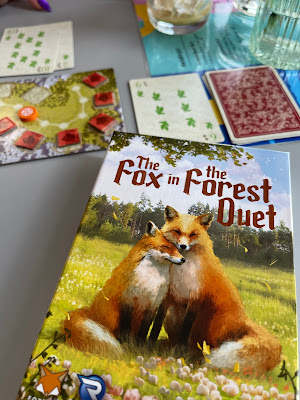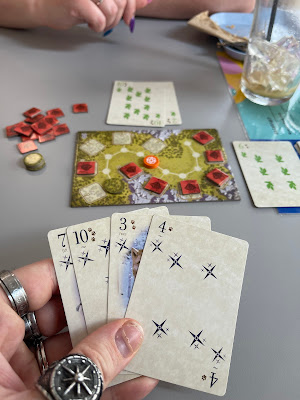It's been a hot minute since we wrote our last Games on Location article (we took Fungi out into the woods), but today we have an extra special edition. You may remember that last year we previewed the fantastic Arctic Anarchy and interviewed its creators Ricky Baker and Lydia Vadgama. Well, during this interview I suggested that they take a copy of their game with them to play while in the arctic circle to do a special Games on Location for us. At the end of June 2025, Ricky and Lydia voyaged to Iceland's capital Reykjavik and further north to Grundarfjörður, Ísafjörður and Akureyri. They then continued on to Alesund in Norway.
The rest of the article is provided to us by Ricky who made some notes on their experiences travelling north with a copy of Arctic Anarchy in their possession.
* * *
Arctic Anarchy on location in Iceland and Norway
The route of our journey meant that we crossed the Arctic Circle when going around Iceland in a North easterly direction, and again when heading towards Norway going South easterly. Naturally it was only fitting that we brought our creation with us. Whilst we did this in the comfort of a cruise ship, our journey did in some ways help us scope out what we might encounter when we embark on our Arctic Quest voyage in Svalbard and give us inspiration for the possibility of an expansion to our game.
No nighttime and folklore inspire possibilities of expansions
Between May and July is known to those in Iceland and Norway as "Period of Midnight Sun", during which the sun does not truly set, but rather sits on the horizon only to rise again after a few short hours. At 6pm the position of the sun makes it seem like midday, and midnight seems like early evening time.
Icelandic and Norwegian folklore is filled with stories of trolls. Much of the landscape tell the stories of these trolls, including "Naustahvilft" (The Troll Seat) located in Ísafjörður.
Thinking about an expansion for Arctic Anarchy, we knew that we would want to introduce and additional dimension to game play for the more experienced board gamers to enjoy. The period of midnight sun and the legends of the Trolls have inspired the idea of adding a "Trolls" card to the events deck. When drawn, the sight of the trolls cause the animals on the iceberg to go into hiding. This manifests itself in the game play as the players having to turn over the animal cards on the iceberg so that the faces are hidden. Any future cards drawn to replace those taken from the iceberg must also be placed face down. As a result, players will be adding animals to their raft blind, until the next event or another troll card is played, (we are yet to decide how the troll card will be cancelled).
Rainbows in Rekjavik and Wildlife icons
Animal cards within Arctic Anarchy are based on native mammal species within the region of Svalbard. Currently the game comprises of Polar Bears (the symbol of Arctic Quest 26), Arctic Foxes, Reindeer, Arctic Hares, Seals, and Whales.
We were lucky enough to see two of these animals in their natural habitat, having spotted a harbour seal off the beaches in Grundarfjörður and a Whale fin whilst at sea.
Another Icelandic icon is the Puffin, with many tourist excursions available to see these in the wild. If that doesn't float your boat, you can visit "Rainbow Street" in Rekjavik, where the cobbles have been painted in stripes of rainbow colour. The street has been decorated in this way as a sign of joy and support for diversity. The initiative is organised by the city of Rekjavik in cooperation with Rekjavik Pride. The street has become an attraction for many visiting the city, and of course there are many shops along the way filled with all manner of puffin themed souvenirs. The puffin, with its colourful beak, seems right at home in this part of the city, and would be a welcomed addition as a new animal type in the Arctic Anarchy game.
For us as creators, the addition of a rainbow puffin card to our game would symbolise the inclusiveness that scouting strives to provide for all its members. It would also reflect our own personal morals and desire for Arctic Anarchy to be a game that can be played by all.
* * *
Hand Limit loves Arctic Anarchy and strongly recommend checking it out wherever and whenever you can. Get in touch with Ricky and Lydia via the Arctic Quest 26 website to pick up a copy or head over to the Gilwell Reunion 2025, Gilwell Park Campsite, London from 29th to 31st August. This is a festival for adults scouting volunteers, where the wider Arctic Quest team will be promoting and raising funds for their expedition.
Stay tuned for more updates on this fantastic game and the journey of the Arctic Quest 26 team.












:strip_icc()/pic6713818.jpg)









.jpg)